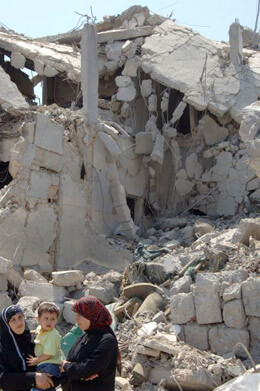United Nations Children's Fund 25 September 2006

Refugees returning to their damaged home in Khiam. (Dina Debbas/IRIN)
Only one of the town’s four health centres is functioning, and to make matters worse, water sources and water treatment plants were also damaged during the hostilities. It could be a long time before they are repaired, and in the meantime there is no running water.
As a result of these conditions, most of the remaining population - approximately 23,500 people - will likely leave for the cities of Beirut or Tyre as winter approaches.
Easier access for aid
To help with the water supply, UNICEF has set up two temporary water tanks in El Khiam. It has also trucked water into the area in bottles labelled with a warning about the dangers of unexploded ordnance and cluster bombs, which pose a grave danger to civilian populations, especially children.
Since the ceasefire took effect here, UNICEF has provided an estimated 2 million litres of water to communities in southern Lebanon, including El Khiam.
“We have an easier access to the south now,” says UNICEF logistics officer Christophe Delaude. “Before we had to move by convoy. Now we can we move truck by truck and do more precise logistics. We can separate the convoys as we could not do before.”
Door-to-door distribution
To help families in the area resume their daily lives, UNICEF has also been distributing two truckloads of hygiene kits. Local volunteers go door-to-door to hand out the kits, which contain basic items such as soap, toothbrushes and towels - with priority given to people who have lost their homes, as well as the elderly and families with young children.
The kits are all the more important since public services are in disarray. Piles of garbage, uncollected for weeks, are rotting at roadsides and pose a potential health hazard. And while some shops have reopened in El Khiam, many people still suffering from the economic impact of the war are unable to purchase what they need.
Meanwhile, many of the town’s children are thrilled at the sight of the hygiene kits, welcoming any distraction from the difficult aftermath of war.
Sabine Dolan contributed to this story from New York.
Related Links
